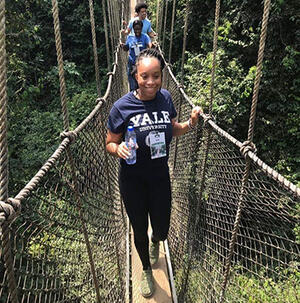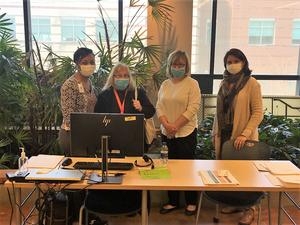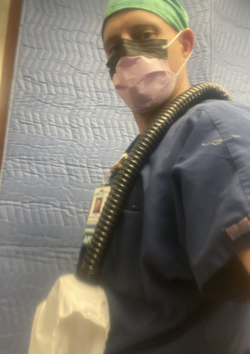Telling the Nursing COVID-19 Story
End of Shift
Nurses at the front lines of care share their experiences through pictures, words, and videos.

After graduating YSN, I ended up staying here in Connecticut and took a job working as a Hospitalist at Charlotte Hungerford Hospital in Torrington. I started there in December and enjoy the work. Each night my job includes admitting patients from the emergency department, covering the floors overnight for any issues, and responding to rapid responses and codes.
I really did not start to get into my groove until right before cases of COVID-19 began to appear here in this state. Connecticut has been hit hard, even in my little rural hospital. I have had patients that I admitted at the beginning of the year that are now returning with COVID-19, many of whom have lost the battle with this deadly virus. One of the very first COVID-19 patients that I admitted has been fighting for their life on a ventilator for over six weeks now. I have watched patients struggle for breath and fight for their lives without family by their side. I have witnessed those who have not survived leave this world while I have done everything in my power to ensure that it was as peaceful as possible. I have been privileged to watch survivors leave the hospital after a long and scary battle.
The class of 2019 has entered practice in a year unlike any other. We had barely begun when we were thrust into a situation that has challenged even the most seasoned medical provider. I have watched my former classmates excel at patient care, educate the public, and hold themselves to a standard that commands respect. We could not have done this without the training that we received.
I could not be doing what I am doing now without the support I received while obtaining my education. I am proud to be a Yale Nurse!
Submitted by: Natalie Hart ‘19 MSN, Adult Gerontology Acute Care Nurse Practitioner
 After graduation, I moved back to my hometown of Cleveland, Ohio, where I had worked as a registered nurse prior to starting school at YSN. I took a position at the Cleveland Clinic, one of the nation’s largest hospital systems, in the respiratory institute. I primarily manage lung nodules, lung cancer, and general pulmonary disease. In the last two years, I have also been working with the rest of our lung cancer screening program to continue to grow and increase access to lung cancer screening and specialty care for individuals with incidentally detected lung nodules that could represent early cancer.
After graduation, I moved back to my hometown of Cleveland, Ohio, where I had worked as a registered nurse prior to starting school at YSN. I took a position at the Cleveland Clinic, one of the nation’s largest hospital systems, in the respiratory institute. I primarily manage lung nodules, lung cancer, and general pulmonary disease. In the last two years, I have also been working with the rest of our lung cancer screening program to continue to grow and increase access to lung cancer screening and specialty care for individuals with incidentally detected lung nodules that could represent early cancer.
I think the only time I’ve experienced a steeper learning curve than my first year of practice as an advanced practice registered nurse was possibly my first semester of undergraduate nursing school. Jumping into a sub-specialty following graduation meant that I had a lot of new material to learn and master before I could really start to do things independently. I was incredibly fortunate to land in a hospital system where, much like YSN, I was surrounded by incredibly bright and supportive colleagues who really helped me find my groove.
Things really changed for everyone at the Cleveland Clinic when COVID-19 began to spread. We were tasked with not only the care of the patients sickened by this new mysterious virus, but also finding ways to ensure that our normal patient population was still receiving care and receiving it safely. We made drastic changes to everything in the entire system to address COVID-19 and the needs of the city and state we serve. We turned our entire medical education campus into a new hospital in a matter of weeks. Some of our regional hospitals were entirely transitioned to care for exclusively COVID-19 patients, and we expanded our online platforms and accessibility to help triage and screen patients for testing. We even cross-trained countless outpatient physicians, nurses, and advanced practice providers such as myself to work inpatient and in the intensive care unit. Still, I think our greatest challenge was trying to ensure that our normal patient population, those with needs like cancer care, screenings, and other chronic disease management, didn’t fall through the cracks or end up neglected because of our shift in focus.
While the pandemic has brought a lot of pain and chaos with it, it has also provided us with a chance to adapt to better serve our patients in the future when these issues strike again. We are more prepared than ever to provide services like telehealth and remote care, and it has yet again showcased the incredible ingenuity and flexibility of our nurses and healthcare community. 2020 has been a rough year so far, but it has been a great example of why we have a “year of the nurse.” Watching all the incredible nurses around me make incredible sacrifices and changes to their jobs and lives to ensure the continued health and safety of those in their community has been beyond inspiring, and I am incredibly grateful for my time at Yale School of Nursing, which prepared me to be a small part of this moment in history.
Submitted by: Elliott D. Race ‘18 MSN, Adult Gerontology Primary Care Nurse Practitioner
 I have accepted a nursing residency at Codman Square Community Health Center, a community-based, community-focused, health care and multi-service center in the heart of the Dorchester neighborhood of Boston, Massachusetts. This is especially exciting for me since this health center is in the neighborhood I grew up in. Health centers like Codman Square are the reason why I decided to go into the nursing field in the first place, so I am grateful to have the opportunity to begin working in my own community as soon as I graduate. Right now, I am preparing for the nursing boards so I can begin the long process of credentialing. I’ll be moving back to Boston in June, and then I’ll start my new position at the end of July.
I have accepted a nursing residency at Codman Square Community Health Center, a community-based, community-focused, health care and multi-service center in the heart of the Dorchester neighborhood of Boston, Massachusetts. This is especially exciting for me since this health center is in the neighborhood I grew up in. Health centers like Codman Square are the reason why I decided to go into the nursing field in the first place, so I am grateful to have the opportunity to begin working in my own community as soon as I graduate. Right now, I am preparing for the nursing boards so I can begin the long process of credentialing. I’ll be moving back to Boston in June, and then I’ll start my new position at the end of July.
In the meantime, I will continue the work I am doing as a registered nurse at a skilled nursing facility which I have grown to love. Especially, in the time of COVID-19, it has been challenging to care for patients both physically and mentally. The toll these times have taken on the families of the people I care for has been heartbreaking at times and humbled me.
Submitted by: Nnemdi Azubuko ‘20 MSN, Family Nurse Practitioner
 Pictured (L-R) behind YSN faculty member Laura Andrews, PhD, APRN, ACNP-BC are Ray Doyle ’17 MSN and Cristiana Clark ’18 MSN. This picture was taken during ICU sign out. Cristiana sent her husband and two young children (and dog Max) away to live with her in-laws because she is on the front line in the ICU treating COVID-19 patients, and she does not want to expose them. It was a hard decision to do this, but she felt she needed to be there for her patients.
Pictured (L-R) behind YSN faculty member Laura Andrews, PhD, APRN, ACNP-BC are Ray Doyle ’17 MSN and Cristiana Clark ’18 MSN. This picture was taken during ICU sign out. Cristiana sent her husband and two young children (and dog Max) away to live with her in-laws because she is on the front line in the ICU treating COVID-19 patients, and she does not want to expose them. It was a hard decision to do this, but she felt she needed to be there for her patients.
Submitted by: Laura Andrews, PhD, APRN, ACNP-BC, Associate Professor of Nursing and Adult/Gerontology Acute Care Nurse Practitioner Specialty Director
 Answering the calls of concerned parents at the Yale-New Haven Covid-19 Pediatric Hotline
Answering the calls of concerned parents at the Yale-New Haven Covid-19 Pediatric Hotline
Pictured are YSN Pediatric Nurse Practitioner Specialty graduates and PNPs in New Haven School-Based Clinics: Vanessa Reid ’05 MSN, Lynn Peckham ’87 MSN, Alison Moriarty Daley ’94 MSN, & Ranbir Bains ’01 MSN
Submitted by: Alison Moriarty Daley ’94 MSN, PhD, APRN, PPCNP-BC, FAAN, Associate Professor of Nursing and Pediatric Nurse Practitioner (PNP) Specialty Director
 Relentless. Aggressive. Cunning. Pervasive yet elusive. For the last six or so weeks, COVID-19 has menaced my ICU. Patient after patient arrives. There is no consistency in their clinical appearance, save one: they are fighting for their lives. Some present with profound respiratory illness, but not all. I’ve seen patients present with bilateral pulmonary emboli, strokes, and GI distress. COVID-19 seems to stalk the older, or more infirm, or those with comorbidities but it is not exclusive to those criteria. I have also treated younger otherwise healthy patients that are now on ventilators, vasopressors, and hemodialysis, perhaps not as often, but certainly with the same ferocity. I am overwhelmed thinking of the sheer numbers of patients that have come through the door of our ICU. We are a community hospital, and thankfully we have survived the initial surge, but at what cost? Staff are overwhelmed, physically, emotionally, and spiritually. Supplies are not limitless. Thoughts of preserving PPE are ever present, as is this nagging worry of not washing hands enough or of carrying this disease home to our families. Yet no one calls out sick, takes a furlough, or refuses to work. We drive to work every day through multitudes of red hearts thanking us for our work; arrive to the unit to food delivered by grateful restaurants; read letters of thanks from patients who have successfully made it home to their families, or at least to rehab and one step closer to home; and watch commercials of gratitude from the public and business sectors. All of that helps push through another day, but we are tired. I am tired. I am overwhelmed. But I am a nurse. No, I meant to say that I am a Yale nurse. And that means something. It means I can do one more day. One more shift. One more patient.
Relentless. Aggressive. Cunning. Pervasive yet elusive. For the last six or so weeks, COVID-19 has menaced my ICU. Patient after patient arrives. There is no consistency in their clinical appearance, save one: they are fighting for their lives. Some present with profound respiratory illness, but not all. I’ve seen patients present with bilateral pulmonary emboli, strokes, and GI distress. COVID-19 seems to stalk the older, or more infirm, or those with comorbidities but it is not exclusive to those criteria. I have also treated younger otherwise healthy patients that are now on ventilators, vasopressors, and hemodialysis, perhaps not as often, but certainly with the same ferocity. I am overwhelmed thinking of the sheer numbers of patients that have come through the door of our ICU. We are a community hospital, and thankfully we have survived the initial surge, but at what cost? Staff are overwhelmed, physically, emotionally, and spiritually. Supplies are not limitless. Thoughts of preserving PPE are ever present, as is this nagging worry of not washing hands enough or of carrying this disease home to our families. Yet no one calls out sick, takes a furlough, or refuses to work. We drive to work every day through multitudes of red hearts thanking us for our work; arrive to the unit to food delivered by grateful restaurants; read letters of thanks from patients who have successfully made it home to their families, or at least to rehab and one step closer to home; and watch commercials of gratitude from the public and business sectors. All of that helps push through another day, but we are tired. I am tired. I am overwhelmed. But I am a nurse. No, I meant to say that I am a Yale nurse. And that means something. It means I can do one more day. One more shift. One more patient.
Submitted by: Philip Martinez ’06 MSN, EdD, APRN-BC, Lecturer in Nursing

Submitted by: Denise Buonocore, ’92 MSN, ’97 PMC, ACNPC, CCNS, CCRN, CHFN

Submitted by: Kate Dzurilla ’18 MSN, YSNAA Board Director and YAA Delegate
Potential for Impact
Christa Hartch, president of the YSNAA Board of Directors, is a PhD student in the Vanderbilt University School of Nursing. In this video she shares her research interest in medication adherence. She plans to do a pilot study of implementing a widely available medication adherence mobile app in an underserved population with chronic illness. With the advent of COVID-19 the idea of supporting patients with digital companions has taken on new importance, and this population has been disproportionately affected by the virus.
Submitted by: Christa Hartch, ’02 RN, MSN, YSN Alumni Board President
In this video, Jocelyn offers an example of teaching nursing through a pandemic using resiliency and hope.
Submitted by: Jocelyn Bessette Gorlin ’84 MSN, PhD, CPNP
